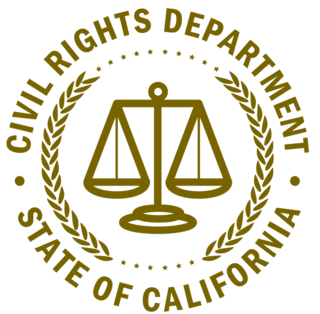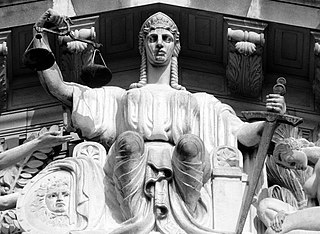Related Research Articles
Arbitration, in the context of the law of the United States, is a form of alternative dispute resolution. Specifically, arbitration is an alternative to litigation through which the parties to a dispute agree to submit their respective evidence and legal arguments to a neutral third party for resolution. In practice arbitration is generally used as a substitute for litigation, particularly when the judicial process is perceived as too slow, expensive or biased. In some contexts, an arbitrator may be described as an umpire.
A class action, also known as a class-action lawsuit, class suit, or representative action, is a type of lawsuit where one of the parties is a group of people who are represented collectively by a member or members of that group. The class action originated in the United States and is still predominantly an American phenomenon, but Canada, as well as several European countries with civil law, have made changes in recent years to allow consumer organizations to bring claims on behalf of consumers.
In English civil litigation, costs are the lawyers' fees and disbursements of the parties.

In English law, natural justice is technical terminology for the rule against bias and the right to a fair hearing. While the term natural justice is often retained as a general concept, it has largely been replaced and extended by the general "duty to act fairly".
Proposition 65 is a California law passed by direct voter initiative in 1986 by a 63%–37% vote. Its goals are to protect drinking water sources from toxic substances that cause cancer or birth defects and to reduce or eliminate exposures to those chemicals generally, such as in consumer products, by requiring warnings in advance of those exposures, with the intended goal being that companies choose to reformulate their products without the substances rather than simply providing notice of such substances in their product.

The Telephone Consumer Protection Act of 1991 (TCPA) was passed by the United States Congress in 1991 and signed into law by President George H. W. Bush as Public Law 102-243. It amended the Communications Act of 1934. The TCPA is codified as 47 U.S.C. § 227. The TCPA restricts telephone solicitations and the use of automated telephone equipment. The TCPA limits companies or debt collectors from calling clients or prospective customers using automatic dialing systems, artificial or prerecorded voice messages, SMS text messages, and fax machines. It also specifies several technical requirements for fax machines, autodialers, and voice messaging systems—principally with provisions requiring identification and contact information of the entity using the device to be contained in the message.

A mortgage-backed security (MBS) is a type of asset-backed security which is secured by a mortgage or collection of mortgages. The mortgages are aggregated and sold to a group of individuals that securitizes, or packages, the loans together into a security that investors can buy. Bonds securitizing mortgages are usually treated as a separate class, termed residential; another class is commercial, depending on whether the underlying asset is mortgages owned by borrowers or assets for commercial purposes ranging from office space to multi-dwelling buildings.

The U.S. Class Action Fairness Act of 2005, 28 U.S.C. §§ 1332(d), 1453, 1711–15, expanded federal subject-matter jurisdiction over many large class action lawsuits and mass actions in the United States.

In tort law, a duty of care is a legal obligation that is imposed on an individual, requiring adherence to a standard of reasonable care to avoid careless acts that could foreseeably harm others, and lead to claim in negligence. It is the first element that must be established to proceed with an action in negligence. The claimant must be able to show a duty of care imposed by law that the defendant has breached. In turn, breaching a duty may subject an individual to liability. The duty of care may be imposed by operation of law between individuals who have no current direct relationship but eventually become related in some manner, as defined by common law.

The Fair and Accurate Credit Transactions Act of 2003 is a U.S. federal law, passed by the United States Congress on November 22, 2003, and signed by President George W. Bush on December 4, 2003, as an amendment to the Fair Credit Reporting Act. The act allows consumers to request and obtain a free credit report once every 12 months from each of the three nationwide consumer credit reporting companies. In cooperation with the Federal Trade Commission, the three major credit reporting agencies set up the web site AnnualCreditReport.com to provide free access to annual credit reports.

The California Civil Rights Department (CRD) is an agency of California state government charged with the protection of residents from employment, housing and public accommodation discrimination, and hate violence. It is the largest state civil rights agency in the United States. It also provides representation to the victims of hate crimes. CRD has a director who is appointed by the governor of California and maintains a total of five offices and five educational clinics throughout the state. Today, it is considered part of the California Business, Consumer Services, and Housing Agency.

Cash Converters International Limited is an Australian ASX-listed personal finance and secondhand retail company headquartered in Perth, Western Australia.
Dennis Jacobs is a senior United States circuit judge of the United States Court of Appeals for the Second Circuit.
Theodore H. Frank is an American lawyer, activist, and legal writer based in Washington, D.C. He is the counsel of record and petitioner in Frank v. Gaos, the first Supreme Court case to deal with the issue of cy pres in class action settlements; he is one of the few Supreme Court attorneys ever to argue his own case. He wrote the vetting report of vice-presidential candidate Sarah Palin for the John McCain campaign in the 2008 presidential election. He founded the Center for Class Action Fairness (CCAF) in 2009; it temporarily merged with the Competitive Enterprise Institute in 2015, but as of 2019 CCAF is now part of the new Hamilton Lincoln Law Institute, a free-market nonprofit public-interest law firm founded by Frank and his CCAF colleague Melissa Holyoak.

Authors Guild v. Google 721 F.3d 132 was a copyright case heard in federal court for the Southern District of New York, and then the Second Circuit Court of Appeals between 2005 and 2015. It concerned fair use in copyright law and the transformation of printed copyrighted books into an online searchable database through scanning and digitization. It centered on the legality of the Google Book Search Library Partner project that had been launched in 2003.

Bias is one of the grounds of judicial review in Singapore administrative law which a person can rely upon to challenge the judgment of a court or tribunal, or a public authority's action or decision. There are three forms of bias, namely, actual, imputed and apparent bias.
R2C2, Inc., owned by Rusty Carroll, is a company located in Carbondale, Illinois, that operates a group of at least nine sites that sold term papers. According to his attorney, they collectively offered a total of 200,000 to 300,000 papers. The sites include: DoingMyHomework.com, FreeforEssays.com, and FreeforTermPapers.com.

Lane vs. Facebook was a class-action lawsuit in the United States District Court for the Northern District of California regarding internet privacy and social media. In December 2007, Facebook launched Beacon, which resulted in users' private information being posted on Facebook without the users' consent. Facebook ended up terminating the Beacon program and created a $9.5 million fund for privacy and security. There was no monetary compensation awarded to Facebook users affected negatively by the Beacon program.

The payment card interchange fee and merchant discount antitrust litigation is a United States class-action lawsuit filed in 2005 by merchants and trade associations against Visa, Mastercard, and numerous financial institutions that issue payment cards. The suit was filed because of price fixing and other allegedly anti-competitive trade practices in the credit card industry. In February 2019, U.S. District Court Judge Margo K. Brodie approved a settlement in the case that amounted to $5.54 billion. After four more years of litigation, in March 2023, the Court of Appeals for the Second Circuit affirmed the District Court’s final approval order, with a modification reducing service awards, and allowing the claims process to move forward.
Frank v. Gaos, 586 U.S. ___ (2019), was a per curiam decision by the Supreme Court of the United States in a case concerning the practice of cy pres settlements in class action lawsuits. Following oral argument, the court asked the parties to submit supplemental briefs addressing whether the parties had Article III standing to pursue the case in federal courts. Supplemental briefing was completed on December 21, 2018. On March 20, 2019, the court remanded the case to the Ninth Circuit to address the plaintiffs’ standing in light of Spokeo, Inc. v. Robins.
References
- 1 2 Steven B. Hantler, Robert E. Northon (Fall 2005). "Coupon Settlements: The Emperor's Clothes of Class Actions". Georgetown Journal of Legal Ethics. CBS Interactive. Retrieved December 30, 2010.